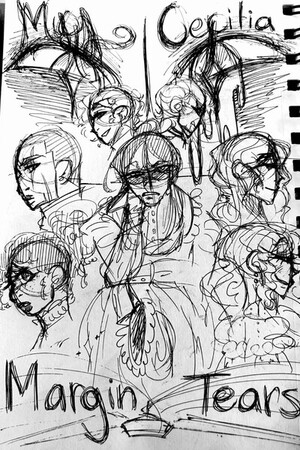Chapter 40:
Brotherly
Margin Tears: My Cecilia
The storm had passed, but the manor still smelled of rain. Damp stone, wet earth, the faint metal of thunder still lodged in the air. Peregrine lingered in the drawing room long after he had left her in the hallway, pacing before the fire that sputtered low in its grate. His hands shook, though whether with anger or despair, he could not tell.
Her words replayed, each syllable sharper the more he turned them over: I do not think of you. And if you value yourself, you will leave me alone.
Leave her be.
As though he were some nuisance. As though his presence were a danger to her—no, worse: as though it did not matter at all. He had offered her what little companionship he could muster, revealed to her pieces of himself he showed no one else. And she had turned from him with eyes lowered, as though ashamed to even meet his gaze.
He sank into the armchair by the hearth, but rest did not come. The leather creaked beneath his weight, and he felt the hollow of the seat deepen around him, as though the very furniture swallowed his shape into invisibility.
Always invisible.
From childhood he had lived in corridors like these, walked in rooms that bore his family’s crest, yet none of them seemed to recognize him as their own. The servants addressed him politely, yes, but never with the quiet fear that accompanied his brother. His brother—always the first to command, the first to charm, the first to draw eyes wherever he went. Peregrine followed after, a second-born shadow, tolerated rather than needed.
Cecilia had been the one exception. Or so he had believed. She had spoken to him without calculation, laughed with him under the cold stars as though he were not lesser, not invisible. For a moment in that balcony night, he had felt—seen. And now even that small light had turned away, leaving him to the cold dark he knew too well.
He leaned forward, elbows to knees, hands raking through his hair. The silence pressed against him like stone. He thought of Cecilia, her trembling voice, her eyes darting downward as though afraid to be caught beside him. Afraid—of what? Of him? Or of losing the greater prize his brother might offer?
The thought festered, splitting open his chest with a familiar ache. Of course she would prefer the lord. Everyone did. He was wealth, he was power, he was danger gilded in charm. And Peregrine—what was he, but a quiet man with nothing to offer? No command, no brilliance, no presence. If his own brother could forget him in a room, why should Cecilia remember?
He rose again, restless, and drifted toward the tall mirror by the window. The glass caught the moonlight and reflected back a face he scarcely recognized: pale, gaunt with sleepless nights, his eyes ringed dark. A man half-formed, blurred at the edges.
He pressed his palm against the cold glass, as though to anchor himself. “Do I even exist at all?” he whispered, though no answer came. Only his own breath fogged the pane, proof that he was there, at least in body. But spirit, soul, worth—those felt absent, stolen long ago by a brother who claimed everything simply by being.
Peregrine turned away, unable to stand his own reflection any longer. He poured himself a glass of brandy from the sideboard and drank it in one swallow, the heat burning down a throat still raw with unspoken grief.
He told himself he hated her now, that foolish maid who had spurned him. He told himself her cruelty had been deliberate, that she had chosen to wound him because he was weak. Yet even as the words repeated, they rang hollow. The truth, unbearable in its simplicity, was that she did not think of him at all.
And that was the greater cruelty.
The fire hissed low, shadows climbing high upon the walls. Peregrine sank back once more into the chair and closed his eyes, but the darkness only made him feel smaller, as though the world could blink and erase him entirely.
He did not know that outside, in the great hall, his brother was watching from the banister above, his eyes glinting with amusement at Peregrine’s solitary pacing. To the lord, his younger brother’s despair was nothing more than another story unfolding—a shadow that served only to highlight his own brilliance.
But Peregrine felt it differently. Alone in his chair, he wondered if he might fade into nothing before the dawn. And for the first time, he thought that perhaps no one—not even Cecilia—would notice if he did.
…
The brandy burned down Peregrine’s throat, but it did not warm him. He sat slumped in the armchair, firelight flickering weakly against his face, his glass empty, his chest hollow. The silence had grown so thick that it seemed to swallow him whole.
Until a voice slipped into it, smooth and cold as oil poured over water.
“You do not wear despair well, brother. It makes you look even smaller.”
Peregrine flinched, jerking upright. Olrin stood in the doorway, framed by shadow, his hands folded behind his back as though this were nothing more than a leisurely stroll through his domain. His eyes gleamed faintly in the firelight, and in their reflection, Peregrine caught a flash of himself—A wilted figure, glass in hand, pathetic before the hearth.
“I did not hear you come in,” Peregrine muttered.
“Few ever do.” Olrin moved closer, his steps soundless and calculated, predatory. He stopped just behind Peregrine’s chair, leaning forward slightly so his words brushed Peregrine’s ear. “I watched you pacing. You look like a boy waiting for praise. Did you expect her to offer it?”
Peregrine stiffened, but said nothing.
“Ah. Silence. How familiar.” The lord circled now, slow, deliberate, until he stood before the chair. He rested one hand upon its arm, his touch too casual, too claiming. “You hoped she might prefer you—you—over me? Poor, foolish baby Peregrine. You’ve always been…what is the word?” He snapped his fingers. “Forgettable!”
Peregrine’s throat tightened. He tried to rise, but the lord’s gaze pinned him still.
“She has abandoned you already, has she not? That girl, my funny little maid. She will not meet your eye, will not spare you a word unless forced. You thought you were special to her, but in truth, she looks at you the way she looks at furniture.” He paused, lips pursed thoughtfully. “No, not even that, really. Furniture is useful at least. All you do is take up space.”
“Stop,” Peregrine whispered, but his voice was parched of strength.
Olrin tilted his head, his smile a razor. “You are unnecessary, Peregrine. To her, to me, to this house. What purpose have you ever served? You cannot charm, you cannot command. You cannot even hold a woman’s gaze. You drift like smoke. A shadow cast by my light. And what are shadows but proof of another’s greatness?”
Peregrine’s hands clenched into fists. He tried to speak, to protest, but his words stuck, withered to rot in his mouth.
Olrin’s voice softened, almost kind, though cruelty laced each syllable. “Better, then, that you fade altogether. Spare yourself the humiliation of being seen for what you are: a man without weight, without worth. The world would scarcely notice if you vanished. Perhaps it would even breathe easier without your tantrums.”
The fire crackled faintly, the only sound between them. Peregrine’s vision blurred, the room wavering as though submerged underwater. His brother’s words sank into him, heavy, unshakable, dragging him down into a depth where air itself seemed too costly to draw.
The lord straightened, brushing his sleeve as though dusting away the encounter. “You need not trouble yourself further, Peregrine. Sleep, drink, drift—Disappear for all anyone cares. It is, after all, the role you were born to play.”
He turned and strode from the room, his steps still soundless, leaving only the echo of his words behind.
Peregrine did not rise. He sat motionless in the chair, staring into the dull embers of the fire until they dimmed to ash. His body remained upright, but something deeper had collapsed entirely, hollowed out by poison whispered with a brother’s intimacy.
He was no longer a man but a vacancy, a shadow in his own house.
And in that vacancy, the lord claimed victory. Peregrine would never again be able to reach for the maid, never again be strong enough to stand beside her, much less aid her in rebellion. He was broken, reduced to silence, just another ghost, a guest wandering the halls of the manor.




Please sign in to leave a comment.